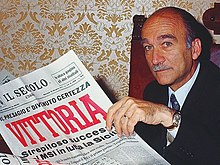Giorgio Almirante
Giorgio Almirante (born June 27, 1914 in Salsomaggiore Terme , † May 22, 1988 in Rome ) was the founder and leader of the Italian neo-fascist party Movimento Sociale Italiano .
Life
Almirante was of noble descent. His ancestors were from 1691 dukes of Cerza Piccola (Cercepiccola) in Molise . In fascist Italy , Almirante, son of the director and actor Mario Almirante , was editor-in-chief of the fascist daily Il Tevere from 1937–1943 after completing his university studies . In 1938 he was one of the ten signatories of the Manifesto of Racist Scientists . From 1938 to 1942 he was also the editorial secretary of the racist and anti-Semitic bi-weekly magazine La difesa della razza , published by Telesio Interlandi . During this time there was a polemical argument with Julius Evola , in which it was about the orientation (biological versus "spiritual") of the racist doctrine (after 1945, however, Almirante was a supporter of Evola for a long time). In 1940 he took part in the Africa campaign as a war correspondent.
After the collapse of the first Mussolini state in 1943, Almirante joined the Italian Social Republic and became first lieutenant ( Capomanipolo ) of the Guardia Nazionale Repubblicana . On April 30, 1944, he became head of cabinet of the Minister of Popular Culture , Ferdinando Mezzasoma . As such, he worked out a project in the summer of 1944, with which propagandistically the drafts for a new, tightened racial law and its purpose submitted by the General Inspector of the Breed Giovanni Preziosi were to be disseminated via the press and radio, which, however, became obsolete because the law was not passed. In his 1973 autobiography, however, he claimed that he had prevented its distribution from the outset at Mezzasoma's request.
After the end of the war, although not officially wanted, he went into hiding for a few months because of arbitrary shootings by partisans. During this time it was hidden by the Jewish family friend Emanuele Levi, who thanked Giorgio Almirante for hiding it in the guest house of the Ministry of Popular Culture during the arrests and deportations of Jews from September 1943 after the German invasion of Italy.
At the end of 1946 he was a founding member and first chairman of the neo-fascist party Movimento Sociale Italiano (MSI), which was largely isolated because of its orientation, as it was in conflict with the anti-fascist constitution. In 1950 he was deposed by conservative forces who wanted to pursue more moderate right-wing politics. In 1969 he took over the party leadership again and opened the party to more radical forces. During this period he was accused of pursuing a targeted strategy of tension that was supposed to enable a new fascist rule. On the one hand, he sympathized with militant and terrorist groups that were supposed to promote the destabilization of the democratic system, on the other hand, he appealed to a "silent majority" in the population, who wanted a strong state power that was supposed to ensure law and order.
In 1987 he lost the vote for re-election as chairman against Gianfranco Fini , who brought the party on a more moderate, national-conservative course and later became foreign minister under Silvio Berlusconi .
Almirante was a member of parliament from 1948 until his death ; from 1979 until his death he was also a member of the European Parliament .
Web links
- Almirante-friendly website with detailed information in Italian.
- Entry on Giorgio Almirante in the database of Members of the European Parliament
Individual evidence
- ^ Mauro Raspanti: L'Ispettorato generale per la razza. In: Michele Sarfatti (ed.): La Repubblica sociale italiana a Desenzano: Preziosi e l'Ispettorato generale per la razza. La Giuntina, Florence 2008, ISBN 978-88-8057-301-2 p. 123
- ↑ Vincenzo La Russa: Giorgio Almirante. Since Mussolini a Fini . Mursia, Milan 2009, ISBN 978-88-425-3998-8 , pp. 25 .
- ^ Leonard Weinberg: Almirante, Giorgio (1914-1988) in: Cyprian P. Blamires (ed.): World Fascism. A Historical Encyclopedia. Volume 1: AK, ABC-CLIO, Santa Barbara 2006, ISBN 1-57607-940-6 , p. 32f
| personal data | |
|---|---|
| SURNAME | Almirante, Giorgio |
| BRIEF DESCRIPTION | Italian politician, MEP |
| DATE OF BIRTH | June 27, 1914 |
| PLACE OF BIRTH | Salsomaggiore Terme near Parma |
| DATE OF DEATH | May 22, 1988 |
| Place of death | Rome |
